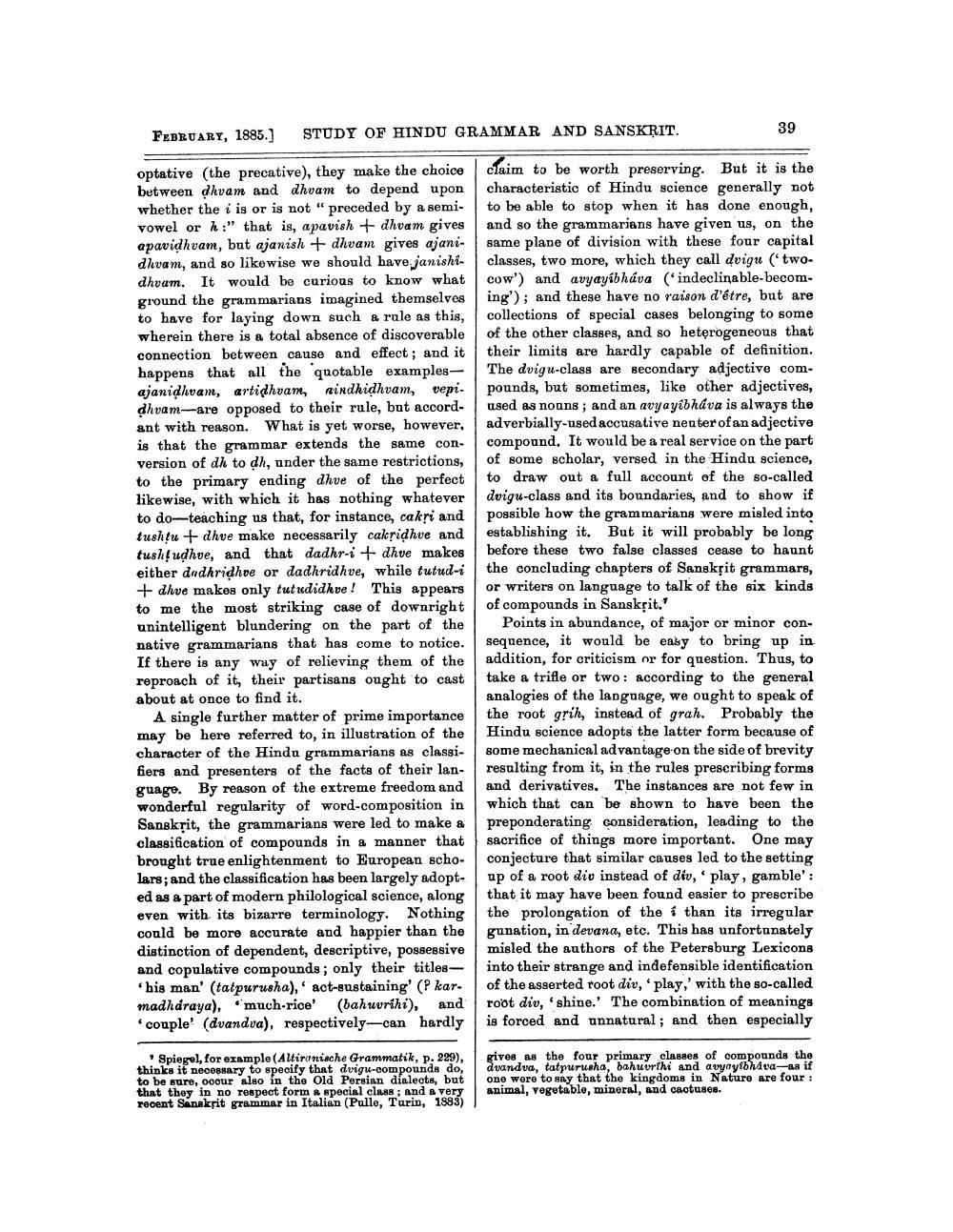________________
FEDRUARY, 1885.]
STUDY OF HINDU GRAMMAR AND SANSKRIT.
39
optative (the precative), they make the choice between devam and dhvam to depend upon whether the i is or is not "preceded by a semivowel or h:” that is, apavish + dhvam gives apavidhvam, but ajanish + dhvam gives ajani- dhvam, and so likewise we should have janishidhvam. It would be curious to know what ground the grammarians imagined themselves to have for laying down such a role as this, wherein there is a total absence of discoverable connection between cause and effect; and it happens that all the quotable examplesajanidhvam, artidhvam, rindhidhvam, vepi. dhvam--are opposed to their rule, but accordant with reason. What is yet worse, however, is that the grammar extends the same conversion of dh to dh, under the same restrictions, to the primary ending dhve of the perfect likewise, with which it has nothing whatever to do-teaching us that, for instance, cakri and tushtu + dhve make necessarily cakridhve and tushy udhve, and that dadhr-i + dhve makes either dadhridhde or dadhridhve, while tutud-i
+ dhve makes only tut udidkve! This appears to me the most striking case of downright unintelligent blundering on the part of the native grammarians that has come to notice. If there is any way of relieving them of the reproach of it, their partisans ought to cast about at once to find it.
A single further matter of prime importance may be here referred to, in illustration of the character of the Hindu grammarians as classifiers and presenters of the facts of their language. By reason of the extreme freedom and wonderful regularity of word-composition in Sanskrit, the grammarians were led to make a classification of compounds in a manner that brought true enlightenment to European scho. lars; and the classification has been largely adopted as a part of modern philological science, along even with its bizarre terminology. Nothing could be more accurate and happier than the distinction of dependent, descriptive, possessive and copulative compounds; only their titles
his man' (tatpurusha),' act-sustaining' (P kar. madhdraya), much-rice' (bahwrihi), and couple' (dvandva), respectively-can hardly
claim to be worth preserving. But it is the characteristic of Hindu science generally not to be able to stop when it has done enough, and so the grammarians have given us, on the same plane of division with these four capital classes, two more, which they call dvigu (twocow') and avyayibháva ("indeclinable-becoming'); and these have no raison d'étre, but are collections of special cases belonging to some of the other classes, and so heterogeneous that their limits are hardly capable of definition. The dvigu-class are secondary adjective compounds, but sometimes, like other adjectives, used as nouns; and an avyayibhava is always the adverbially-used accusative neuter of an adjective compound, It would be a real service on the part of some scholar, versed in the Hindu science, to draw out a full account of the so-called dvigu-class and its boundaries, and to show if possible how the grammarians were misled into establishing it. But it will probably be long before these two false classes cease to haunt the concluding chapters of Sansksit grammars, or writers on language to talk of the six kinds of compounds in Sanskrit.'
Points in abundance, of major or minor consequence, it would be easy to bring up in addition, for criticism or for question. Thus, to take a trifle or two: according to the general analogies of the language, we ought to speak of the root grih, instead of grah. Probably the Hindu science adopts the latter form because of some mechanical advantage on the side of brevity resulting from it, in the rules prescribing forms and derivatives. The instances are not few in which that can be shown to have been the preponderating consideration, leading to the sacrifice of things more important. One may conjecture that similar causes led to the setting up of a root div instead of div,' play, gamble': that it may have been found easier to prescribe the prolongation of the i than its irregular gunation, in devana, etc. This has unfortunately misled the authors of the Petersburg Lexicons into their strange and indefensible identification of the asserted root div, play, with the so-called root div, shine. The combination of meanings is forced and annatural; and then especially
Spiegel, for example (Altironische Grammatik, p. 229), thinks it necessary to specify that dvigu-compounds do, to be sure, ooour also in the Old Persian dialects, but that they in no respect form a special class; and a very recent Sanskrit grammar in Italian (Pulle, Turin, 1883)
gives as the four primary classes of compounds the avandva, tatpurusha, bahuurthi and avyoyfbhdva-as if one wore to say that the kingdoms in Naturo are four : animal, vegetable, mineral, and caotuses.




